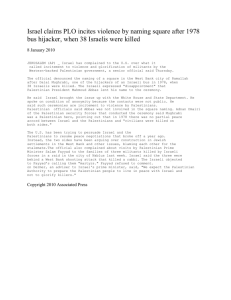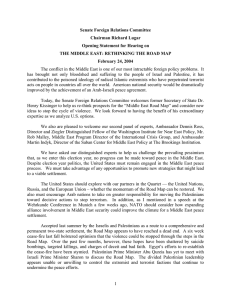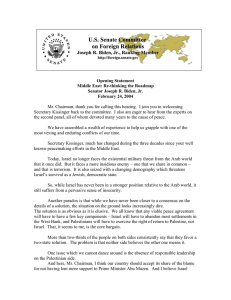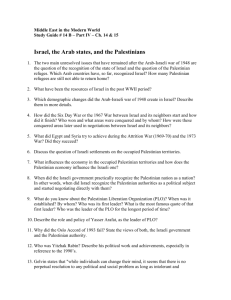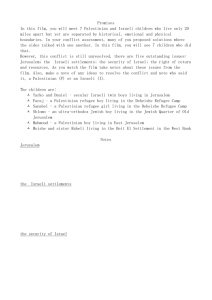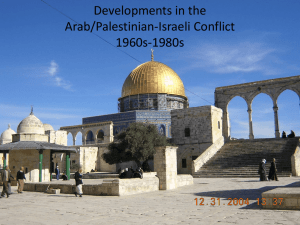STATEMENT OF THE HONORABLE HENRY A. KISSINGER BEFORE THE
advertisement
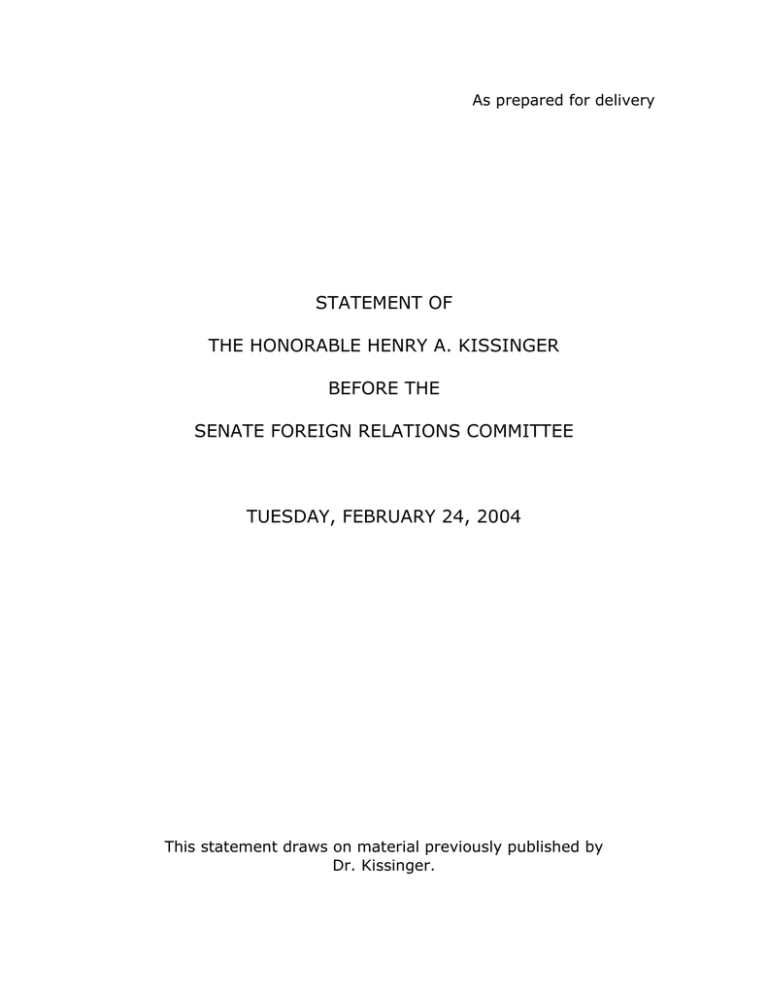
As prepared for delivery STATEMENT OF THE HONORABLE HENRY A. KISSINGER BEFORE THE SENATE FOREIGN RELATIONS COMMITTEE TUESDAY, FEBRUARY 24, 2004 This statement draws on material previously published by Dr. Kissinger. Mr. Chairman: The Arab-Israeli conflict has proved so resistant to diplomacy because the obstacles to a solution are in some respects more psychological than diplomatic. Israel is militarily stronger than any conceivable Arab adversary; it is clearly able to inflict heavy losses on Palestinian terrorist groups. But it has also evolved into a middle-class advanced society and, as such, the strain of guerrilla warfare is psychologically draining, generating an ambivalent rigidity in Israeli society. Prior to the Oslo agreement, the Israeli peace movement viewed reconciliation with the Arab world primarily in terms of psychological reassurance; land would be traded for peace and recognition even though Israeli concessions were permanent and the Arab quid pro quo would be revocable. But since the intifada, the vast majority of Israelis no longer believe in reconciliation; they want victory and the crushing of their Arab adversaries. At the same time, there is growing uneasiness over the openendedness of the enterprise. With the apparent endlessness of the intifada and the stalemate in the peace process, a sense of resignation is growing. The desire to turn on the tormentors is beginning to be offset by signs of a hunger for peace at almost any price. Israel finds itself facing the classic dynamic of guerrilla warfare as it has played out for two generations now. The terrorists not only do not recoil from terrorism but practice an egregious form of it because a violent, emotional, (and to bystanders) excessive retaliation serves their purpose: it may trigger intervention by the international community, especially the United States, to end the conflict by imposing a peace. That process gradually reduces Israel’s sense of security even while the world’s media and diplomats bewail its alleged excesses. Torn between a recognition of strategic necessities and the pull of emotional imperatives, Israel runs the risk of sliding into institutionalized ambivalence. On the Palestinian side, expulsion from a territory for centuries considered Arab is an open wound; accepting the perceived Israeli intrusion has thus far been beyond Palestinian emotional and psychological capacities. The internal Palestinian debate is essentially over how to overcome the Jewish state; one group is arguing for permanent confrontation, while moderates are willing to move toward 2 the same objective in stages. Only a tiny minority considers permanent coexistence desirable. In the half-century of Israel’s existence, no Palestinian leader has fully recognized Israel or renounced the right of refugees to return. Even the Palestinian signatories of the Geneva Accord went no further than to relate the return of refugees to a proportion of refugees accepted by third-party countries. Government-sponsored public assaults on the very concept of a Jewish state are unremitting. The breakthrough in Egyptian-Israeli negotiations took place in 1977, when President Anwar Sadat made his historic trip to Jerusalem and, among other gestures, laid a wreath on the Tomb of the Unknown Soldier. There has never occurred a similar act of grace on the part of Palestinian leaders. When so little confidence exists, it is difficult to move in one step from impasse to a final solution. At the same time, there are some hopeful signs. The formal deadlock may be obscuring the possibility that, almost imperceptibly, a framework for an agreement is emerging. In Israel, Prime Minister Ariel Sharon’s recent pronouncements suggest that the dominant Likud party is undergoing soul-searching based on the recognition that the biblical claim to all of Palestine involves a demographic time bomb as Arabs become a majority and demand control of the entire land. This change of attitude implies a willingness to give up much of what Israel gained in the 1967 war in return for Palestinian acceptance of the 1948 defeat and the division of the land of Palestine. At the same time, the Palestinians may be in the process of learning that they have no military option and that, at least for tactical reasons, coexistence with Israel is unavoidable. An increasing number of Arab states would settle for any terms acceptable to Palestinians. A forthcoming proposal has come from Crown Prince Abdullah of Saudi Arabia. According to its imprecise outline, Israel would return to the dividing lines of 1967 in exchange for the normalization of relations with the Arab states. Literally, this would imply Israeli abandonment of all settlements and Arab control of the Old City of Jerusalem, including the holy places. The Abdullah plan does not define what is meant by normalization, and is silent about such issues as the return of refugees which would surely be insisted on in an actual negotiation. 3 This first engagement in the peace process by an Arab state not having a direct national conflict with Israel nevertheless includes positions that have produced the existing deadlock. The 1967 “border” in Palestine – unlike the Egyptian, Syrian, or Jordanian frontiers with Israel — was never an international frontier but a ceasefire line established at the end of the 1948 war. It was never recognized by any Arab state until after the 1967 war and has been grudgingly accepted recently by states that do not yet recognize the legitimacy of Israel. I have never encountered an Israeli prime minister or chief of staff who considered the ’67 borders defensible. Despite all these obstacles, both sides may be in the process of reconsidering previous attitudes. The Palestinians have suffered vast losses and the total disruption of their economy. Israel has learned that demography threatens its existence; a large and rapidly growing Arab population undermines the prospects for a state at once Jewish and democratic. Annexation of significant portions of the West Bank can no longer be considered a national Israeli interest. This may be why all the parties have endorsed — with varying degrees of conviction — a document listing forty simultaneous steps to be carried out in three stages. Drafted by the United States, Russia, the European Union, and a representative of the Secretary-General of the United Nations, and labeled the “Road Map,” its implementation is supposed to be supervised by the quartet that drafted it. Nevertheless, we must be careful not to exaggerate what the Road Map stands for. It is not a recipe for resolving the Middle East deadlock. Rather, it represents a reasonable compromise on rather general objectives. These goals are stated as if they could be achieved simultaneously by each side acting more or less autonomously. The Road Map does not establish criteria for verification, consequences of violation, or the sequence of acts within each stage. The language veers toward truisms. For example, with respect to refugees, the Road Map calls for an agreed “just, fair, and realistic settlement.” To the Palestinian “fair and just” means a return of most refugees, and to the Israeli “realistic” means, at most, a token return of refugees. The negotiators working their way through these generalities have some positive elements to sustain them. The new impetus to diplomacy reflects the revolutionary changes wrought by American policy in the Middle East. The elimination of Iraq as a significant 4 military force has removed for a considerable period the possibility of an Arab-Israeli war fought by regular armies. The American insistence that the Palestinian Authority produce a more representative and responsible negotiating partner than Arafat has provided the framework to weaken the terrorist structure on the West Bank. A combination of these factors has encouraged Prime Minister Sharon to offer the elimination of settlements established in violation of Israeli law, to proceed to dismantle the settlements in Gaza, and to acquiesce in the concept of the creation of a Palestinian state with “contiguous” territory — the code word for opening a discussion over the future of settlements that impede this objective. If this were a negotiation unencumbered by historical and psychological legacies, one could note the respect in which the parties have approached each other: on the creation of a Palestinian state; on ending the occupation in the greatest part of the West Bank; on the principle of abandoning at least settlements beyond the dividing line; on the need to end terrorism. What is lacking is even the minimum of trust to negotiate the implementation of these principles. The Palestinians believe that Israel seeks to reduce the Palestinian state to a series of enclaves surrounded by Israeli territory and pierced by an Israeli road network — in short, a state virtually indistinguishable from limited internal autonomy. Most Israelis are convinced that for the Palestinians any agreement represents only a stage in an ultimate war of extermination. Arab and Palestinian newspapers and schoolbooks and Arab and Palestinian television treat the state of Israel as an illegitimate interloper that must be removed from the Arab world. Allied divisions have compounded the problem. Critics attack U.S. policy for what they consider one-sided support of Israeli policy. At the same time, almost all European leaders have advocated a solution which does not meet the realities of the moment or of historical experience: the return of Israel to the ‘67 borders with only the most minor modifications; the consequent abandonment by Israel of all (or nearly all) of the Israeli settlements established since; partition of Jerusalem; some accommodation to the Palestinian view on return of refugees, all this to be imposed by the U.S. The quid pro quo is an undefined “normalization” and perhaps an international guaranteeing force. The quid pro quo of normalization is a special characteristic of the Arab-Israeli negotiations. In almost all 5 other negotiations, mutual recognition of the parties is taken for granted, not treated as a concession. In fact, nonrecognition implies the legal nonexistence of the other state, which, in the context of the Middle East, is tantamount to an option to destroy it. Israel was established by a U.N. resolution in 1948. No other members of the United Nations have been asked to pay a premium for recognition. Nor is an international guaranteeing force a solution. For what precisely does an international guarantee mean? Against what danger does it protect and by what means? The historical record of multilateral guarantees is dismal, especially in the Middle East. International guarantees are likely to prove empty against terrorism. If Israel’s armed forces with a vast stake in the outcome could not prevent infiltrations, how is an international or even an American force going to do it? It is much more likely to prove a barrier against Israeli retaliation than against Palestinian terrorism. The probable outcome is that an international force would become hostages who will either purchase their safety by turning their backs on violations or, if they risk their lives by serious efforts, they will incur casualties at which point the governments supplying the forces will be under pressure to withdraw them. No progress is possible without a major diplomatic effort by America. But America should not be asked to break Israel’s psychological back and jeopardize its existence as an independent state. Having lived unrecognized by its neighbors for most of its history, subjected to systematic terrorism, surrounded by states technically at war with it, and aware of an essentially unopposed publicity campaign against its existence throughout the Islamic world, Israel will not base its survival on assurances and guarantees without a clear assurance regarding its security requirements. It needs defensible frontiers and a strategy that gives it a plausible opportunity to withstand the most likely dangers. The end of terrorism must go beyond a cease-fire, which keeps the threat alive, to the dismantling of the terrorist supporting structure. Even if dismantling the terror apparatus proves difficult to do quickly, ending the systematic rejection of Israeli legitimacy and incitement to terror in the media are within the scope of immediate Palestinian decision. Above all, Palestinian and Arab leaders must find a way to convey that they have accepted the permanence of Israel’s existence. 6 At the same time, Israel needs to take American advocacy of a contiguous Palestinian state seriously. It implies not only an end of new settlements but a reduction of the existing ones that impede the promised contiguous Palestinian state, and the new strategic frontier must reflect genuine security needs. The practical implication is that the Road Map’s goal of a comprehensive settlement by 2005 is unachievable. It is unimaginable that a new Palestinian prime minister precariously extracted from Yasser Arafat will be in a position to renounce the right of Palestinians to return to their place of origin in the early stages of the Road Map process. It is inconceivable that Israel would make a final agreement that does not contain such a clause or that it would entertain transfers of populations without a tested period without terrorism — if then. Thus even if a comprehensive agreement is the ultimate goal, it must contain within it a prolonged interim period for testing the commitment to peaceful coexistence. But if comprehensive peace is not achievable within the time frame established by the Road Map, the establishment of a provisional Palestinian state as envisaged in Stage II can be realized. The goal will not be comprehensive peace, which is a legal concept, but coexistence, which reflects the absolute precondition for peace. A “coexistence agreement” could be helped rather than hindered by the fence Israel is in the process of creating, though not in the present location. A physical barrier is more effective than an international guaranteeing force. It would facilitate Israeli withdrawal from the Palestinian cities and the abandonment of checkpoints that deprive so much of Palestinian life of dignity. By the same token, Israel must be serious about leaving the territories and the settlements beyond the security fence to Arab jurisdiction. A security barrier would provide a line on the other side of which settlements would have to live under Palestinian rule or be abandoned. Is the Palestinian objection primarily to the fence, in principle, or to the ratification of the permanence of Israel that the fence represents? The intrusion of the fence beyond the 1967 borders should be kept to a strategically necessary minimum. But the principle of it is important: It should not be discouraged by the United States; rather, the United States should try to shape it to contribute to what seems the best way to a rapid breakthrough. The alternative of some sort of imposition conceived by conventional wisdom might well bring peace 7 at the price of encouraging continued irredentism and turning the agreement into a prelude for another round of confrontation. An interim agreement may be the only way to keep the refugee issue from blocking a settlement. Any agreement deserving the appellation “final” must resolve the refugee question. No Israeli government can settle for less; no Palestinian leader has yet been found to renounce unambiguously the right of return. If that problem should prove insoluble, the security fence could provide a provisional dividing line that makes possible a Palestinian state even before a final settlement. The territorial adjustments could be balanced by returning some portions of Israeli territory to Palestinian rule. Particular attention should be paid to areas where a return of Arab population would ease the demographic problem. In that context, a provisional arrangement for Palestinian government in Arab sections of Jerusalem can be discussed. Such an approach requires freeing Middle East diplomacy from some of its formalistic, almost doctrinaire, constraints. Our partners in the quartet need to view Middle East peace as something more complex than a device for using the United States to extract concessions from Israel for little more than the word “peace.” The Palestinians must make a choice between the requirements of genuine acceptance of the Jewish state and an interim solution that creates a Palestinian state immediately and marks a major step toward dealing with the settlement issue, even if it falls short of the entire range of their aspirations. Israel must abandon a diplomacy designed to exhaust its negotiating partners and instead concentrate, in close coordination with the United States, on the essentials of its requirements. A comprehensive diplomacy to achieve these objectives should have the following components: --The United States would play a principal mediating role in the negotiation of an interim agreement, buttressed by a general statement of objectives for the overall goals, providing a link between an interim and a comprehensive settlement. Our European allies could contribute by suspending the flood of plans by which they seek to improve their position in the Arab world but in reality radicalize it by raising unfulfillable expectations: 8 --A major contribution could be the Mideast initiative put forward by German Foreign Minister Joschka Fischer and in the process of being discussed by European and American leaders. A concept of a Middle East development and political reform project jointly undertaken by the Atlantic and Middle Eastern nations would create a context defined by positive goals rather than inherited hatreds. Any lasting settlement implies ultimate reconciliation, and a major international effort should be undertaken to help restore civilian life in the Palestinian state. Once confidence is restored and true coexistence evolves, the incentive to maintain the security fence may well disappear. --The Palestinian Authority needs to reinstitute itself along more representative lines. The moderate Arab states should facilitate the negotiations by encouraging adjustments in the Palestinian position they would not dare on their own. --Europe and the United Nations, backed by the United Sates, could generate an international commitment to assist in the creation of a viable Palestinian entity, at first under an interim agreement and later on when a permanent settlement is reached. That commitment would imply a level of assistance that could be effective only in the context of a new set of institutions. For both sides, a resolution will be traumatic. For many in Israel, the abandonment of settlements and the partition of Jerusalem will be perceived as a repudiation of much of the history of the Jewish state. For the Palestinians, it will be an end to the myth by which their society has lived. America’s role is central: It needs to overcome the illusion that America can impose some paper plan and, at the same time, to move the parties with determination toward a goal that seems, at last, conceptually within reach.
